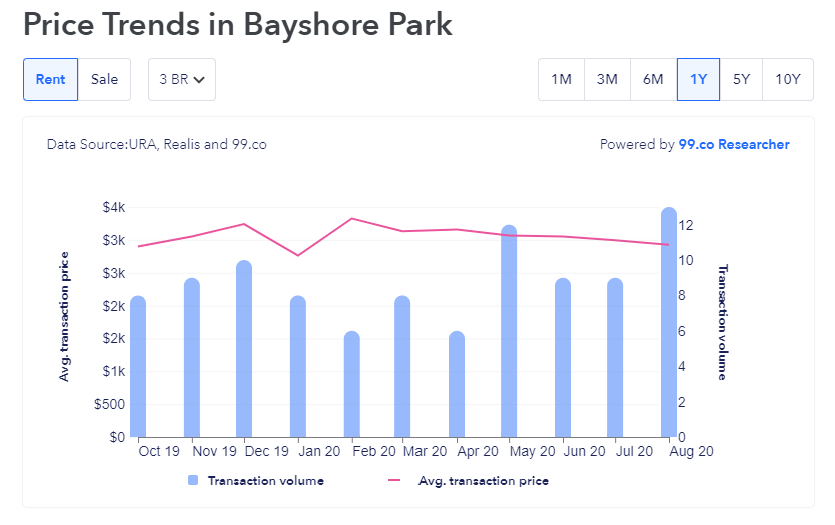Faced with a competitive rental market due to the onslaught of Covid-19, landlords are now feeling the squeeze from expats leaving Singapore or downgrading to a smaller rented home.
Most of these landlords have significant mortgage obligations that depend on consistent rental income, and prolonged vacancy would mean being unable to service the home loan for the property. In particular, retirees who depend on rental income for living expenses will also be hit hard.
The consequences are dire, with the worst case scenario being forced to sell the rental property at a loss.
Even if there are no major financial pitfalls, landlords still have to pay maintenance fees (if it’s a private condo) and property tax on the vacant property.
But there are ways for landlords to minimise vacancy even during the Covid-19 downturn. And these four methods might just rescue your investment:
Tip #1: Pay attention to trends in the vicinity of your rental home
Some property investors take a hands-off approach to renting out their investment property. A ‘hands-off’ investor might be living in Woodlands and have a District 9 property in the CBD that they rent out, and they seldom, if ever, set foot anywhere near their rented out property.
If you’re dependent on rental income, now is not the time to be hands-off. Check out the area and visit your condo and you’ll notice some trends that may matter, such as increased sightings of mover vans. Other than gossip, condo security guards can also yield a goldmine of useful information regarding the comings and goings of tenants of a particular condominium.
But if you don’t have the time to physically assess how your rental property is doing, property portal 99.co offers free and readily available rental data for every condo in Singapore so you can keep an eye on average rental in the development, as well as transaction volume.

In the chart above, rental for three-bedroom units at Bayshore Park condominium has been experiencing a gradual downtrend in 2020. If you’re a landlord who owns a property here, for instance, having this information is vital to helping you decide whether to retain a tenant who is asking for a lower rent, or find a new one.
Tip #2: Be proactive with your current tenant
You probably know which company your expat tenant(s) work at and even stalked their LinkedIn profiles, and feel you can anticipate if any of them might get the sack during the Covid-19 downturn. But that’s not all there is to a lucrative landlord-tenant relationship.
To minimise vacancies, landlords need to build rapport with their tenants if they don’t want to be suddenly issued with a termination notices and be left starting at zero rental income in one or two months’ time.
Aside from responding to the tenant quickly when any issue with the property arises, the landlord would ideally have an emphathetic understanding of your tenant’s work situation by being friendly without being intrusive.
To build good landlord-tenant relationships, landlords may wish to emphasise to the tenant that the lines of communication between them are open anytime. Being open to considering an request to temporarily lower rent for a tenant-in-need is, in most cases, far better than losing the tenant altogether.
You don’t need to go to great lengths to build rapport, but we know a veteran landlord who surprises his tenants with a bottle of wine on their birthdays, and his tenants usually stay for four years or more!
Even if you’re not the chummy type, at the very least you’d want to ask your current tenant about their plans three months (90 days) before the lease expires*. You can even offer the tenant a favourable rent, based on market rate, if they can to give you a yes/no answer within 30 days.
That way, if they don’t commit to renew within the one-month period, you can get a good head-start in searching for a new tenant, minimising vacancy.
*If you have to increase rent, also do it 90 days in advance to give the tenant time to weigh their options. Announcing a rent increase too late will encourage a knee-jerk reaction to move out.
Tip #3: Schedule upgrades strategically
Most landlords wait until repossession of a unit after a tenant leaves to conduct maintenance and upgrades on the property. But there might be a better way to go about it.
If you have a tenant on a two-year lease for a whole unit, you might want to announce, for instance, that you would like to upgrade the television or oven, or give the house a fresh coat of paint, 1.5 years into the lease—just before the tenant begins to think about whether to stay or move.
It’s even more beneficial to have these well-timed upgrades if you’re a stay-in landlord, since you’ll be able to reap the rewards of the improvements yourself. One landlord who 99.co spoke to convinced his Indonesian tenants to stay when he purchased a new game console for the apartment, even though it was the landlord that did the bulk of the gaming!
Having well-timed upgrades to the rental home will not only make a good case for the tenant to stay, it’ll also help the landlord maintain the original rent in this challenging period (or dissuade the tenant from asking to lower rent), because there are obvious upgrades to the tenant’s living environment. The upgrades can be conducted at a time when the tenant is out of the house for prolonged periods, such as when he/she is overseas.
If everything in still in tip-top condition, then consider some small gesture such as sending in pest control to put in place pest prevention measures.
Tip #4: Don’t be so uptight on rules
Whether they’re renting out a room or the entire unit, Singaporean landlords aren’t the most trusting when it comes to their tenants. For example, ‘no cooking’ and ‘no pets’ are common criteria that are turn-offs for renters, and actually contribute to turnover and prolonged vacancies.
If you’re worried about the repercussions of heavy cooking or pets, you can always levy a higher security deposit or, in the case of pets, specify that you’ll additionally deduct an amount from the deposit for deep cleaning after the lease is over.
Probably the worst, most uptight clauses to include in a tenancy agreement (TA) is one that restricts visitors. Stay-in landlords have good reason to restrict visitors, but instead of including a blanket “no visitors” clause in the TA, landlords can limit the number of visitors at any one time, set restrictions on the timing of visit and require the tenant to inform the landlord prior to the visit.
For landlords who don’t stay in, there’s even fewer reason to limit visitors to the property. If you’re renting out individual rooms, having a master tenant that reports to you will help you keep an eye on anything amiss. By and large, you should trust your tenant because you’d have already screened any potential tenants before signing the TA.
In general, the less uptight you are with the rules, the less likely the property will stay vacant.

Tip #5: Make your home a “smart home”
Many landlords are adopting ‘smart home’ technologies for their own home, but overlook the same for their rented properties. Agents that 99.co spoke to told us that tenants nowadays increasingly tend to be swayed by smart home features such as centralised lighting controls, smart TVs, automated systems, and digital locks.
When making your rental home attractive to prospective tenants, the “smart home” hack works because not many landlords have done it yet. If you throw in a bunch of high-tech gadgets, your rental home will stick out in the minds of the multiple homes that the prospective tenant might have viewed, especially if you’re looking to target younger professionals as tenants.
Tip #6: Set up a ‘referral programme’
Here’s where renting out individual rooms, instead of the whole unit, might have its perks. If you have the fortune of having a great tenant but have a vacancy coming up, you can ask them to refer their colleagues or friends to rent the room.
Once two tenants who know each other stay together in the same apartment, they’ll be less likely to move.
To sweeten the deal, you may even offer the existing tenant a small incentive if they successfully refer a new tenant, like a one-time rent rebate of $100.
Tip #7: Take photography seriously
Too many landlords and their agents don’t give two hoots about how the rental property looks in a photo. Too bad, they’ll have to bear the consequence of extended vacancies.
Landlords have to understand that, right now, they’re not just competing with scores of other landlords for a handful of renters, they are also going head-to-head against co-living companies that are fighting for the same pool of tenants.
These co-living companies, which offer fully-furnished, Insta-worthy rental accomodation in private apartments across Singapore, are also charging slightly higher rent partly because the photography on their listings is beautifully executed. They also list on property portals such as 99.co, giving landlords a run for their money.
Taking the effort to use properly lit, wide-angle photos that showcase your rental home will help you find tenants quicker, give you a bigger pool of prospective tenants to choose from and minimise vacancy.
With numerous interior photography tutorials and tips available on YouTube and smartphone cameras more than up to the task, you don’t even have pay to hire a professional photographer!
Have any other tips for landlords to minimise vacancies? Share them with us in the comments below!
If you found this article useful, 99.co recommends 5 Annoying Things I Learned Trying to Find my Own Tenant and 5 incredibly cheap ways to retain good tenants
Looking for a property? Find your dream home on Singapore’s most intelligent property portal 99.co!
The post Landlord Tips: 7 Ways to Minimise Vacancy for Residential Rental Property appeared first on 99.co.

